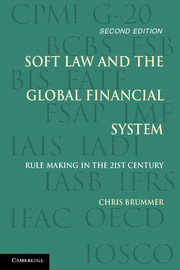Book contents
- Frontmatter
- Contents
- Preface to the New Edition
- Acknowledgments
- Key Abbreviations
- Introduction: The Perils of Global Finance
- 1 Territoriality and Financial Statecraft
- 2 The Architecture of International Financial Law
- 3 A Compliance-Based Theory of International Financial Law
- 4 How Legitimate is International Financial Law?
- 5 Soft Law and the Global Financial Crisis
- 6 Implementing the G-20 Agenda: A Transatlantic Case Survey
- 7 The Future of International Financial Law
- Index
4 - How Legitimate is International Financial Law?
Published online by Cambridge University Press: 05 November 2015
- Frontmatter
- Contents
- Preface to the New Edition
- Acknowledgments
- Key Abbreviations
- Introduction: The Perils of Global Finance
- 1 Territoriality and Financial Statecraft
- 2 The Architecture of International Financial Law
- 3 A Compliance-Based Theory of International Financial Law
- 4 How Legitimate is International Financial Law?
- 5 Soft Law and the Global Financial Crisis
- 6 Implementing the G-20 Agenda: A Transatlantic Case Survey
- 7 The Future of International Financial Law
- Index
Summary
For over half a century, ferocious academic and policy debates have addressed the legitimacy and accountability of the global economic system. Key international organizations, including the WTO, World Bank, and IMF, have long exhibited organizational characteristics that, in the eyes of many, are not consonant with democratic principles. Wealthier countries, for example, have dominated the policy and rule making of these institutions, and developing nations have had relatively little voting power. Commentators from around the world have called on radical organizational reform in order to bolster the acceptability of these key institutions in monetary affairs and international development.
As international financial law has become more prominent over the last two decades, it, too, has become subject to various criticisms regarding the legitimacy of its constituent processes. Soft institutions can be coercive – a point underscored in the previous chapter. As in the case of many international economic institutions such as the WTO, countries are not equal and do not have the same input into the formulation of international financial standards by new institutional actors such as the G-7, G-8, or G-20. Indeed, in some cases, countries (and their publics) may be excluded from any formal participation in the articulation of international financial rules, and even stakeholders in participating countries may have little opportunity to inform the rulemaking process. Thus, not all countries are treated in a fair and equitable manner, and their populations are effectively sidelined. In terms of established democratic theory, these structural inequities present a serious challenge to legitimacy.
The implications of such democratic deficits – though perhaps overlooked from the standpoint of systemic risk – have long been anticipated by international legal theorists. From Immanuel Kant to Thomas Franck, theorists have argued that, in one way or another, states obey, and should obey, only those rules perceived to have been born by legitimate processes. If international rules and standards are considered illegitimate and are unaccountable to national and international publics, they are unlikely to be persuasive, authoritative, and compelling, even when organizations exert coercive influence. According to this line of argument, illegitimate or unaccountable international financial law will inescapably fall short in any efforts to impose discipline on the global financial system and to address emerging financial and market risks.
- Type
- Chapter
- Information
- Soft Law and the Global Financial SystemRule Making in the 21st Century, pp. 183 - 217Publisher: Cambridge University PressPrint publication year: 2015



